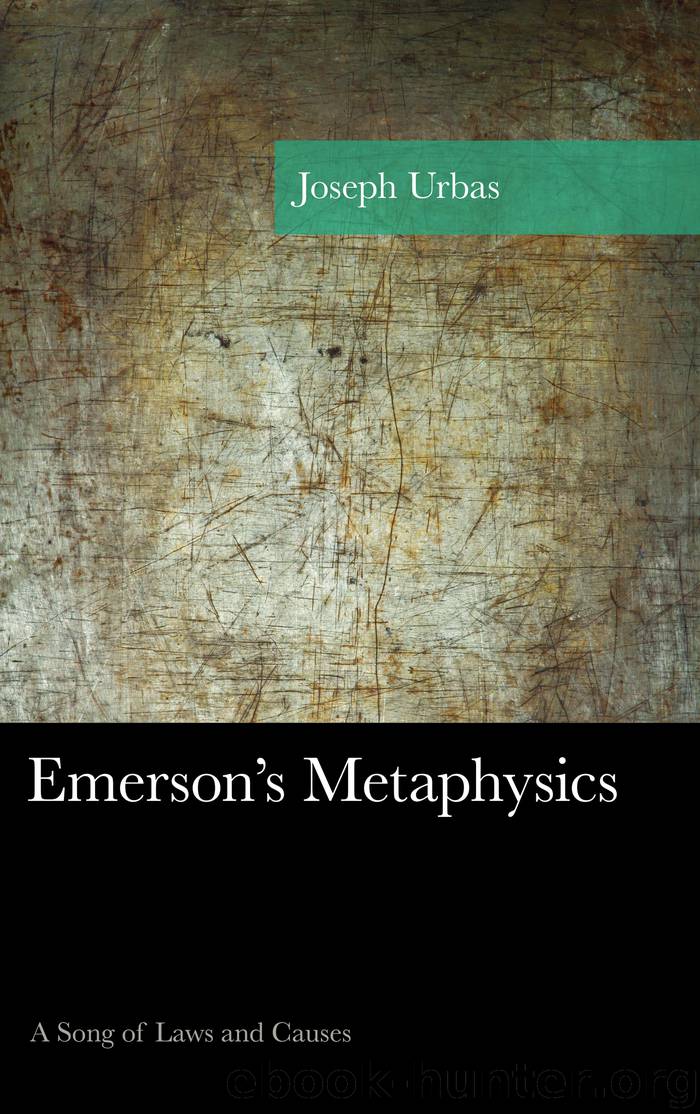Emerson's Metaphysics by Urbas Joseph;

Author:Urbas, Joseph;
Language: eng
Format: epub
Tags: undefined
Publisher: Lexington Books
Published: 2012-03-20T16:00:00+00:00
Emerson’s public critique of historical Christianity and the Church thus had a metaphysical basis clearly formulated in his mind. Nor was he alone in this. Theodore Parker’s distinction between the transient and the permanent elements in Christianity is at bottom a metaphysical distinction between two types of causality: one is distant, punctual, temporally and spatially restricted in its operation; the other, immanent, ever-present and ever-active both in nature and man. As examples of the first type of causality, Parker attacks two representations of God as Cause: on the one hand, the “naturalist” God of Deism or rationalism; on the other, the “supernaturalist” God of “historical worship” in New England, whether Calvinist or Unitarian (Matters, 197–206). But, Parker notes, “[their] philosophy is at bottom the same” (207)—that is, Lockean empiricism, which produces, in both cases, the wrong kind of cause. Rationalism or naturalism “reduces the Idea of God to that of an abstract cause, and excludes this cause both from man and the world” (203); Supernaturalism, though it “admits the immanence of God in nature,” makes him “transiently active in man, not immanent in him” and “restrict[s] the divine presence and action to time, places and persons” (212, 213). Parker advocates, instead, “the natural-religious view, or spiritualism,” which represents God as a cause that is “omnipresent and omniactive,” immanent in man, with inspiration being “no miracle, but a regular mode of God’s action on conscious spirit, as gravitation on unconscious matter” (216). Parker’s analogy to natural law is not accidental. His critique of historical Christianity is informed by a metaphysical realism that draws a sharp distinction between ontology, on the one hand, and epistemology on the other:
Now the true system of Nature which exists in the outward facts, whether discovered or not, is always the same thing, though the philosophy of Nature, which men invent, change every month, and be one thing at London and the opposite at Berlin. Thus there is but one system of Nature as it exists in fact, though many theories of Nature, which exist in our imperfect notions of that system, and by which we may approximate and at length reach it. Now there can be but one Religion which is absolutely true, existing in the facts of human nature, and the ideas of Infinite God. That, whether acknowledged or not, is always the same thing and never changes.[46]
Download
This site does not store any files on its server. We only index and link to content provided by other sites. Please contact the content providers to delete copyright contents if any and email us, we'll remove relevant links or contents immediately.
The remains of the day by Kazuo Ishiguro(8347)
Tools of Titans by Timothy Ferriss(7748)
Giovanni's Room by James Baldwin(6760)
The Black Swan by Nassim Nicholas Taleb(6730)
Inner Engineering: A Yogi's Guide to Joy by Sadhguru(6413)
The Way of Zen by Alan W. Watts(6263)
Asking the Right Questions: A Guide to Critical Thinking by M. Neil Browne & Stuart M. Keeley(5326)
The Power of Now: A Guide to Spiritual Enlightenment by Eckhart Tolle(5300)
The Six Wives Of Henry VIII (WOMEN IN HISTORY) by Fraser Antonia(5202)
Astrophysics for People in a Hurry by Neil DeGrasse Tyson(4980)
12 Rules for Life by Jordan B. Peterson(4146)
Housekeeping by Marilynne Robinson(4026)
The Ethical Slut by Janet W. Hardy(4016)
Skin in the Game by Nassim Nicholas Taleb(3948)
Double Down (Diary of a Wimpy Kid Book 11) by Jeff Kinney(3884)
Ikigai by Héctor García & Francesc Miralles(3838)
The Art of Happiness by The Dalai Lama(3826)
Skin in the Game: Hidden Asymmetries in Daily Life by Nassim Nicholas Taleb(3704)
Walking by Henry David Thoreau(3664)
